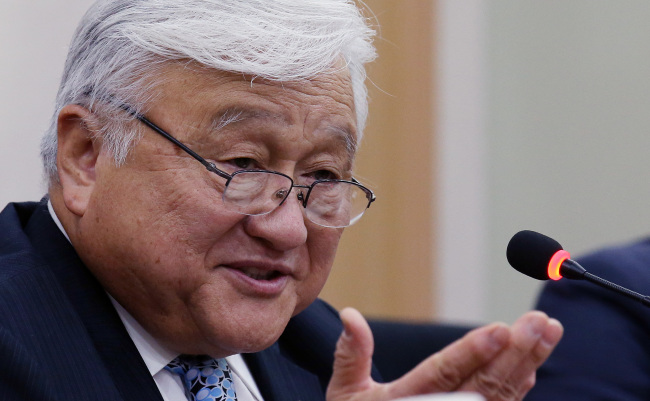U.S. lawmaker urges Japan to apologize over wartime sex slavery
By Korea HeraldPublished : Dec. 18, 2014 - 21:15
A U.S. lawmaker on Thursday called on Japan to apologize over its wartime sexual enslavement of South Korean women in the near future in the latest diplomatic pressure put on Tokyo to face up to history.
Rep. Michael Honda (D-California) said it is “nonsense” to raise questions about the coercive nature of the sex slavery, adding that the issue has gained urgency as the number of surviving victims is on the decline. Only 54 victims remain alive in South Korea, with their average age standing at 88.
Honda, a Japanese descent, has spoken out against Japan’s denial of its wartime history, such as sex slavery.
In 2007, he spearheaded an effort for the passage of a landmark resolution condemning Japan’s coercion of South Korean and other Asian women into sexual slavery during World War II.
Rep. Michael Honda (D-California) said it is “nonsense” to raise questions about the coercive nature of the sex slavery, adding that the issue has gained urgency as the number of surviving victims is on the decline. Only 54 victims remain alive in South Korea, with their average age standing at 88.
Honda, a Japanese descent, has spoken out against Japan’s denial of its wartime history, such as sex slavery.
In 2007, he spearheaded an effort for the passage of a landmark resolution condemning Japan’s coercion of South Korean and other Asian women into sexual slavery during World War II.

“Coercion was there. It is a great part of why girls and women were kidnapped into sexual slavery,” Honda said in an interview with a group of South Korean reporters in Seoul.
“The violence against women cannot be tolerated. Sexual slavery of the past is still the same issue as human trafficking today.”
His comments came amid no signs of progress in addressing the issue of former sex slaves ― one of the key sticking points in relations between Seoul and Tokyo for decades. Japan ruled the Korean Peninsula as a colony from 1910 to 1945.
Seoul and Tokyo have held meetings to resolve the issue since April, but no major progress has been made mainly because Japan has not shown a sincere commitment to facing up to its history.
Still, Honda said that the talks can be “productive and helpful” in resolving the issue, but the meetings should not be protracted, given the sense of urgency of the matter.
Historians estimate that up to 200,000 Asian women, mostly Koreans, were forced into sexual servitude for Japan’s soldiers during World War II.
Honda said the U.S. government should be more active in urging Tokyo to move forward on the sex slavery issue as he called for the international community to pay more attention to the issue.
“Hopefully, we can move this issue from creating greater political pressure and peer pressure to the government of Japan,” Honda said. “Hopefully, this gives the state department or our administration a greater platform to urge Japan to apologize appropriately.”
Honda led efforts to attach a rider to a spending bill for the 2014 fiscal year that called for the U.S. secretary of state to pay more attention to the issue of Japan’s sexual slavery.
Honda arrived in Seoul a day earlier for a five-day visit to Seoul to meet with government officials to discuss an alliance between Seoul and Washington and situations in Northeast Asia.
Honda’s itinerary in Seoul includes a visit to a house for former sex slaves in Gwangju, located about 28 kilometers southeast of Seoul.
In August 2012, Honda visited the facility, together with Rep. Eni Faleomavaega of American Samoa’s at-large congressional district. (Yonhap)
-
Articles by Korea Herald







![[Graphic News] More Koreans say they plan long-distance trips this year](http://res.heraldm.com/phpwas/restmb_idxmake.php?idx=644&simg=/content/image/2024/04/17/20240417050828_0.gif&u=)
![[KH Explains] Hyundai's full hybrid edge to pay off amid slow transition to pure EVs](http://res.heraldm.com/phpwas/restmb_idxmake.php?idx=644&simg=/content/image/2024/04/18/20240418050645_0.jpg&u=20240419100350)








![[KH Explains] Hyundai's full hybrid edge to pay off amid slow transition to pure EVs](http://res.heraldm.com/phpwas/restmb_idxmake.php?idx=652&simg=/content/image/2024/04/18/20240418050645_0.jpg&u=20240419100350)

![[Today’s K-pop] Illit drops debut single remix](http://res.heraldm.com/phpwas/restmb_idxmake.php?idx=642&simg=/content/image/2024/04/19/20240419050612_0.jpg&u=)